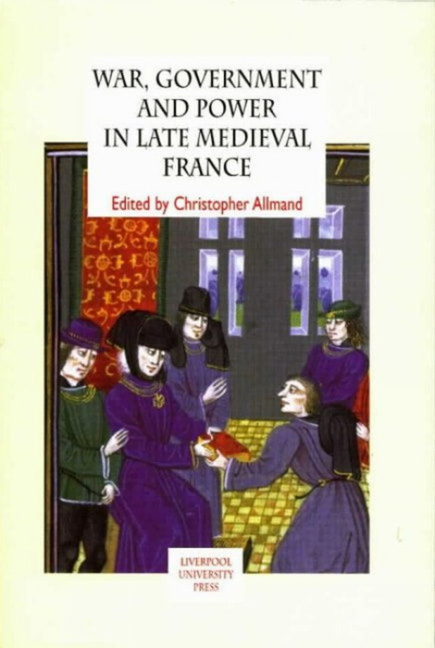Book contents
- Frontmatter
- Contents
- Dedication
- Acknowledgements
- Abbreviations
- Introduction
- 1 From the Court of Hainault to the Court of England: The Example of Jean Froissart
- 2 Froissart and his Second Book
- 3 Alain Chartier and the Arts of Crisis Management, 1417–1429
- 4 Intellectual Patterns and Affective Reactions in Defence of the Dauphin Charles, 1419–1422
- 5 War, Propaganda and Diplomacy in Fifteenth-Century France and England
- 6 History and the Literature of War: The Boke of Noblesse of William Worcester
- 7 Commynes on Kingship
- 8 ‘Centre’, ‘Power’ and ‘Periphery’ in Late Medieval French Historiography: Some Reflections
- 9 Centre and Periphery in Late Medieval France: Tournai, 1384–1477
- 10 ‘Decayed Feudalism’ and ‘Royal Clienteles’: Royal Office and Magnate Service in the Fifteenth Century
- 11 Justification and Theory of the Death Penalty at the Parlement of Paris in the Late Middle Ages
- 12 Membra disjecta of the Breton Chambre des Comptes in the Late Middle Ages: Treasures Revisited and Rediscovered
- Glossary
- Index
2 - Froissart and his Second Book
- Frontmatter
- Contents
- Dedication
- Acknowledgements
- Abbreviations
- Introduction
- 1 From the Court of Hainault to the Court of England: The Example of Jean Froissart
- 2 Froissart and his Second Book
- 3 Alain Chartier and the Arts of Crisis Management, 1417–1429
- 4 Intellectual Patterns and Affective Reactions in Defence of the Dauphin Charles, 1419–1422
- 5 War, Propaganda and Diplomacy in Fifteenth-Century France and England
- 6 History and the Literature of War: The Boke of Noblesse of William Worcester
- 7 Commynes on Kingship
- 8 ‘Centre’, ‘Power’ and ‘Periphery’ in Late Medieval French Historiography: Some Reflections
- 9 Centre and Periphery in Late Medieval France: Tournai, 1384–1477
- 10 ‘Decayed Feudalism’ and ‘Royal Clienteles’: Royal Office and Magnate Service in the Fifteenth Century
- 11 Justification and Theory of the Death Penalty at the Parlement of Paris in the Late Middle Ages
- 12 Membra disjecta of the Breton Chambre des Comptes in the Late Middle Ages: Treasures Revisited and Rediscovered
- Glossary
- Index
Summary
Without being a ‘poor relation’, Froissart's Second Book has to date received relatively less attention from critics, editors and translators than either the First, Third or Fourth Books. Anthologies usually include a few extracts from chapters recounting the Flemish Revolt and its suppression; this is partly because they are so dramatically written, but also because they still constitute an acknowledged source of information about the events of 1378–85. A partial translation into Modern French was published some ten years ago under the title Chroniques de Flandre, de Hainaut et d'Artois au temps de la Guerre de Cent Ans. This offers no more than sixty pages’ coverage of events in Flanders between 1380 and 1382, but the editors are to be commended for pointing out that, however partial Froissart's depiction of events in the Low Countries may be, he contrives to adopt such a wide range of viewpoints that essential aspects of the conflict are constantly placed before the reader. They also remind us that Froissart evinces considerable sympathy here for the rebels of Ghent. Worried that modern Flemish readers might take umbrage at the amount of space allotted in this edition to the tragedy of Roosebeke, the author of the Avant-Propos (F. Suard) proffers the following reassurance:
… que nos amis Flamands veuillent bien nous excuser: l'importance que nous donnons ici au récit de Froissart ne résulte pas d'une délectation suspecte, que l'attitude de l'historien n'autoriserait guère: si Froissart se révèle partisan des Français, c'est parce qu'il redoute la ‘contagion communale’, mais il montre de l'estime pour les Flamands.
We crave our Flemish readers’ indulgence: the amount of space allotted to Froissart's account does not proceed from a questionable enjoyment on our part, which the chronicler's attitude would not in any case warrant: if Froissart shows himself favourable to the French, it is because he is afraid that political unrest in the Communes may prove contagious; he does, however, evince respect for the Flemings.
It is refreshing to read Monique Sommé's reminder that Froissart ‘ne put exercer ses activités d’écrivain que grâce à l'appui de protecteurs qui, tous, avaient des liens étroits avec la puissante maison comtale du Hainaut’ (‘was only able to exercise his skills as a writer thanks to the support afforded by patrons who all enjoyed close links with the powerful comital house of Hainault’).
- Type
- Chapter
- Information
- War, Government and Power in Late Medieval France , pp. 21 - 36Publisher: Liverpool University PressPrint publication year: 2000



